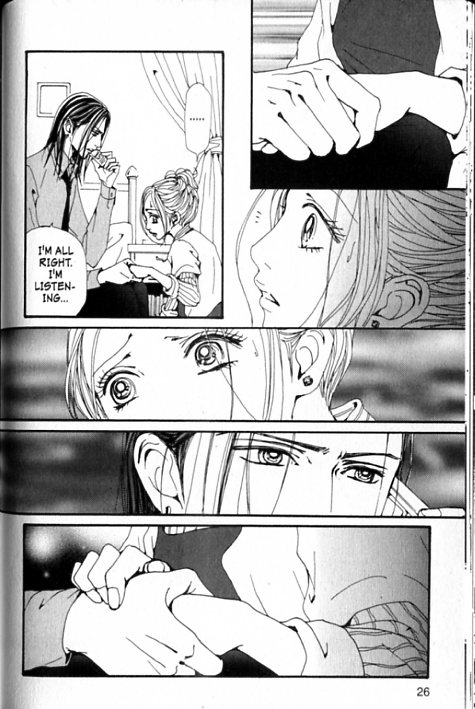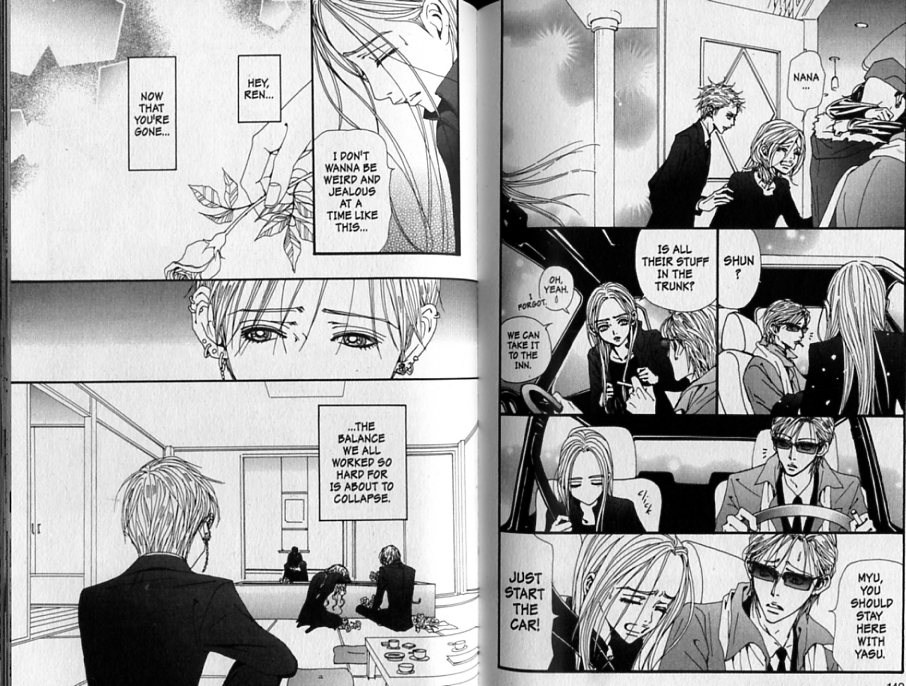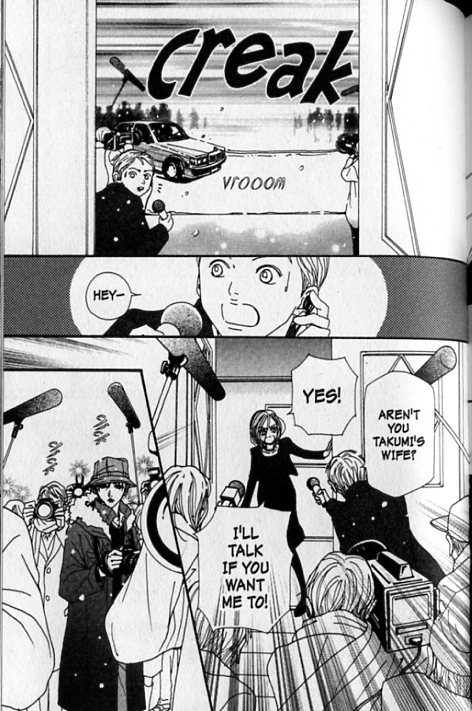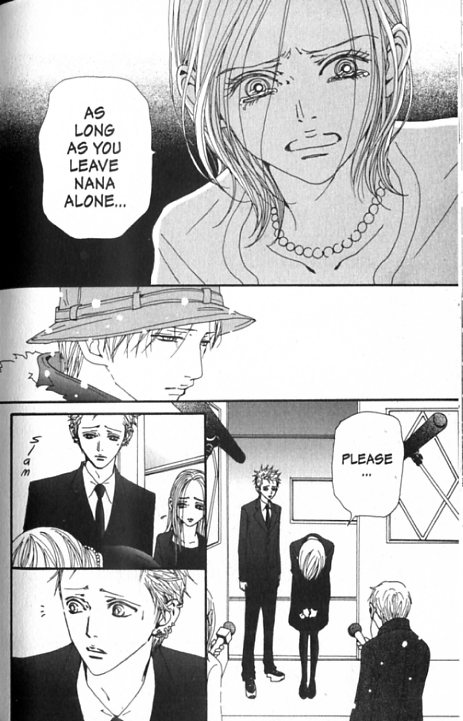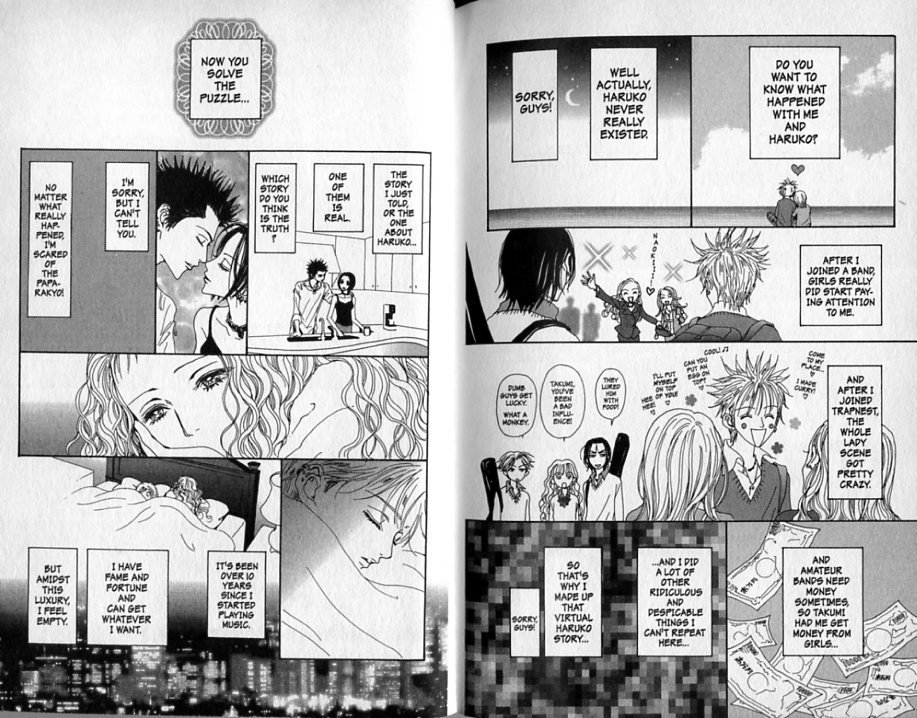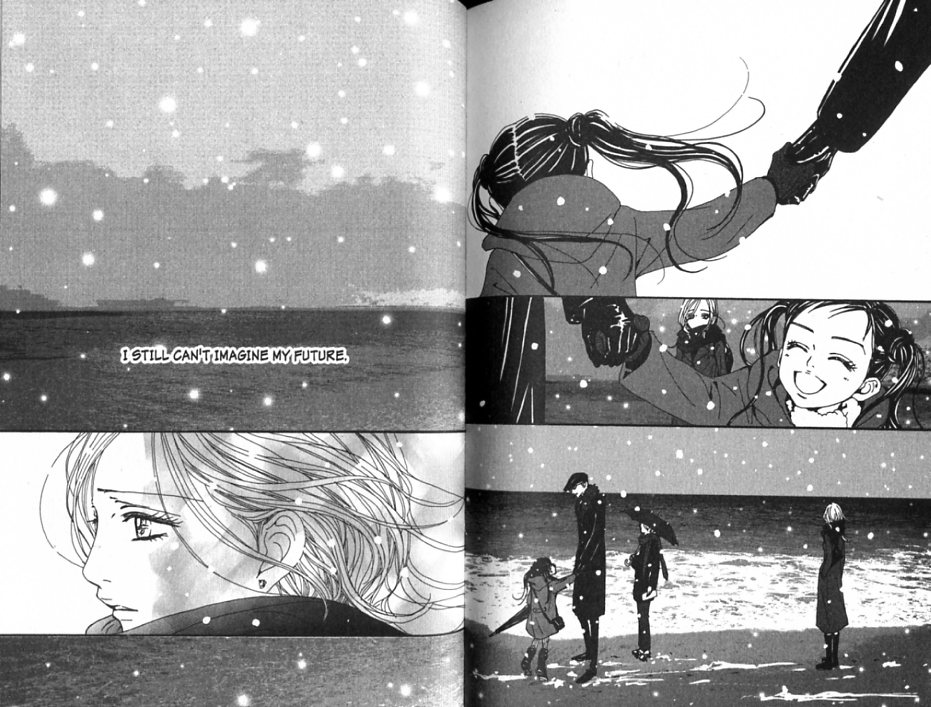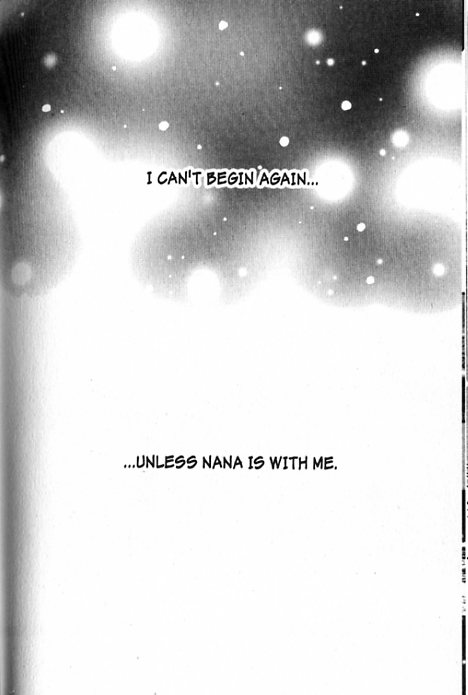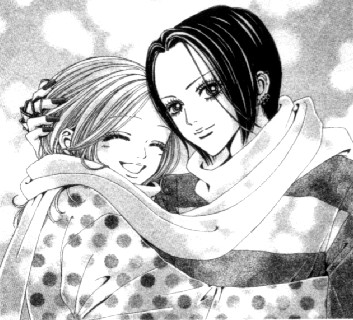The last issue of Ai Yazawa’s Nana in English is volume #21. The series stopped publishing in 2010, when Yazawa contracted an unknown illness. She hasn’t been able to work since.
Nana could not have picked a worse moment to come to an abrupt end. In Volume #20, Ren, the lead guitarist of Trapnest and the boyfriend of Nana Osaki, dies in a car crash. Volume #21 is an extended, painful depiction of grief, in all its overwhelming, banal detail. At this point in the series, after hundreds and hundreds of pages, we know all of Yazawa’s characters intimately, and their every characteristic and uncharacteristic action as they learn of their loss takes on an almost unbearable weight.
For example, it seems like the most natural thing in the world for a husband to grab his wife’s hand for support — except that distant, assholish, controlling Takumi hardly ever reaches out to anyone for anything. Nana Komatsu (or Hachi) knows her husband shouldn’t be behaving like this; she looks down at her hand as if she’s afraid it’s going to fall off. Ironically, soon after this, when Takumi views Ren’s body, he sees that the only part of Ren not badly damaged in the accident were his hands, which, a guitarist to the end, he protected during the crash. Ren’s fingers, carefully preserved, hold nothing, while Takumi and Hachi’s, unnaturally, hold, and are held by, his death. It’s not just that there’s space where there should be presence, but that there’s presence where there should be space. Ren can’t hold anything except those he leaves behind.
In another sequence, Yasu, Ren’s childhood friend who has an intense long term platonic relationship with Nana, goes to tell her that Ren has died. She’s a rockstar in her own right, and is on tour. Yasu has to fly out to get her and then they drive all night to get back home to see Ren’s body. When they come out of the car, Yasu carries Nana, who is draped over him helplessly. Yasu’s girlfriend, Myu, takes one look at them and flees:
Whereas Takumi’s reaction resonates because it’s not normal, Myu’s is touching because it is. Like Yasu, she’s level-headed and thoughtful. For him, that means being there for Nana when no one else will or can. For her, it means knowing when to get herself out of the way.
The scene that most affected me, though, occurs a couple pages earlier, when Nana’s car pulls up. Earlier in the series, Nana and Ren’s relationship became a gigantic tabloid news story; in fact, Ren’s car crash was caused in part because he was fleeing the papparazzi. Naturally, then, there’s a scrum of reporters waiting for Nana when she arrives, ready to ask her about Ren’s death. Hachi, Nana’s former roommate and one of her closest friends, intervenes:
Again, the sequence gets its power because we’ve known Hachi so long. She’s a strikingly hapless and needy airhead. She spends the series desperately glomming onto a series of men (and arguably women too) in an effort to get somebody else to provide the backbone and rational decision making functions that she so spectacularly lacks.
And yet, while Hachi is exasperating, she’s also very sympathetic…and this sequence helps to get at why. Over the course of the manga, Hachi develops a huge, somewhat ridiculous hero-worshipping crush on rock-star Nana. This seems like it should be another sign of Hachi’s puppyish infantilism — the nickname “Hachi” is in fact a dog’s name given to her by Nana. But instead of cementing her helplessness, Hachi’s clinging to Nana blurs into a kind of mothering, with Nana, estranged from her own mother, turning increasingly, semi-secretly, and desperately to her friend.
And so, in this sequence, when the worst ha happened, Hachi does what mothers often do, and sacrifices herself for her baby. It reminds me a little of my mother-in-law, who, like Hachi, is in many ways, infuriatingly flighty, and who, like Hachi, married too young. Yet, when my father-in-law (that man she married) was dying of brain cancer, she fed him and cleaned him and struggled tirelessly with a series of indifferent doctors and hospitals to get him the best possible care. Watching her was more than a little awe-inspiring.
Hachi here is awe-inspiring too…but there’s also something heart-breakingly futile about her attempted bargain with the reporters. Nobody takes her up on her interview offer…and indeed, Nana is swept out of the car too quickly for anyone to really get at her, it seems like. Hachi’s sacrifice ends up being superfluous; the story wouldn’t be changed at all without those two pages. Her love and her strength don’t really matter…just like, for all my mother-in-law’s efforts and care, her husband died just the same.
Life is filled with such blind alleys, of course, where the narratives sputter and stall and then go on; where the storyteller seems to have abandoned her work. Genre fiction, on the other hand, always know where it’s going — what’s the point of genre after all if you don’t have a blueprint? Nana, certainly, is as insistently artificial as any soap opera melodrama, packed with tell-tale and impossible coincidences. On the micro level, the two protagonists have the same name; on the macro level, everybody in the manga either becomes a rock star or marries one. That’s the inevitable teleology of fiction, not the stuttering uncertainty of fact.
Yet Nana‘s extended discursive format, and the way Yazawa privileges the characters and their emotions over the steady churn of events, often give the series a feeling of being weirdly aimless and fragile. In Nana #9, for example, Yazawa includes a short story purportedly about Naoki, Trapnest’s drummer. It starts with him dying his hair daringly blond, and then proclaiming to his parents, “It’s the real me, maman!”
That could be the start of a tale about discovering one’s true inner rebel rock star. But instead, Yazawa goes in the opposite direction; Naoki narrates, but what he narrates is almost entirely about other characters — or more precisely, about his misinterpretations of the other characters. He thinks Takumi and Yasu are gangsters, he misinterprets Takumi’s relationship with Reira (the Trapnest singer); he fails to recognize Yasu when the later changes his hair. The story isn’t about Naoki finding his real self, instead, it’s about how he fails to discover everyone else’s.
Finally, towards the end of the piece, we learn that there is a center to Naoki’s life — his relationship with his hometown sweetheart, Haruko.
Or, then again…
Haruko may be real, or she may not; her drawn image is either the the core of Naoki, or a meaningless surface. Moreoever, the meditation on truth and lies in the pages above is contrasted, not with pictures of Naoki, but with pictures of Nana and Ren. Haruko isn’t real, Naoki isn’t real…and of course, Nana and Ren aren’t real either. They’re just a dream. In the context of a serialized soap opera, this meta moment, where the headlong narrative collapses into itself, is unsettlingly disorienting. These people we know as friends are just visual illusions; line drawings on the top of nothing. The effect is not so much to knock us out of this story, as to knock us out of any story, including our own. Instead of images arranging themselves into a sequence, they seem to hang still, unorganized bits and pieces that refuse to make a whole. Genre falls apart, as ungraspable as life, or as death.
There’s a similar effect in the latter part of the series, when Yazawa begins to let us see glimpses into the future of her characters. But these futures are less a terminus, giving finality and shape to the whole, than a way to extend and double the narrative’s irresolution. Nana-to-come has run away and is living incognito…but perhaps she’ll return. Takumi-to-come and Hachi-to-come are estranged. But that’s not the end of their relationship. It’s simply another stage in it, as subject to change and vacillation as the past. There is no happily ever after, not because there isn’t a happily, but because there’s no ever. The characters keep falling out of the genre narrative, or else the genre narrative falls from around them, like snow dissolving. “After your death, the future we all hoped for was wiped clean,” future Hachi says to the long- passed Ren. “I still can’t imagine my future. I can’t begin again unless Nana is with me.” But while she’s saying that, the future goes on; her daughter plays with Yasu, the waves go in and out, the snow comes down. The plot is gone, but she’s still there, lamenting the fact that death is an end, and also lamenting the fact that it’s not.
Those are the last pages in Nana #21. The series hangs there still, waiting for Yazawa to come back, or never to come back, just as Hachi is waiting for Nana. We’re stuck with grief and a future that won’t tell us what it means. Maybe that’s why sometimes the worst comic book is the one that was never written — the page that you can’t turn, and can’t stop turning.
__________
Click here for the Anniversary Index of Hate.

